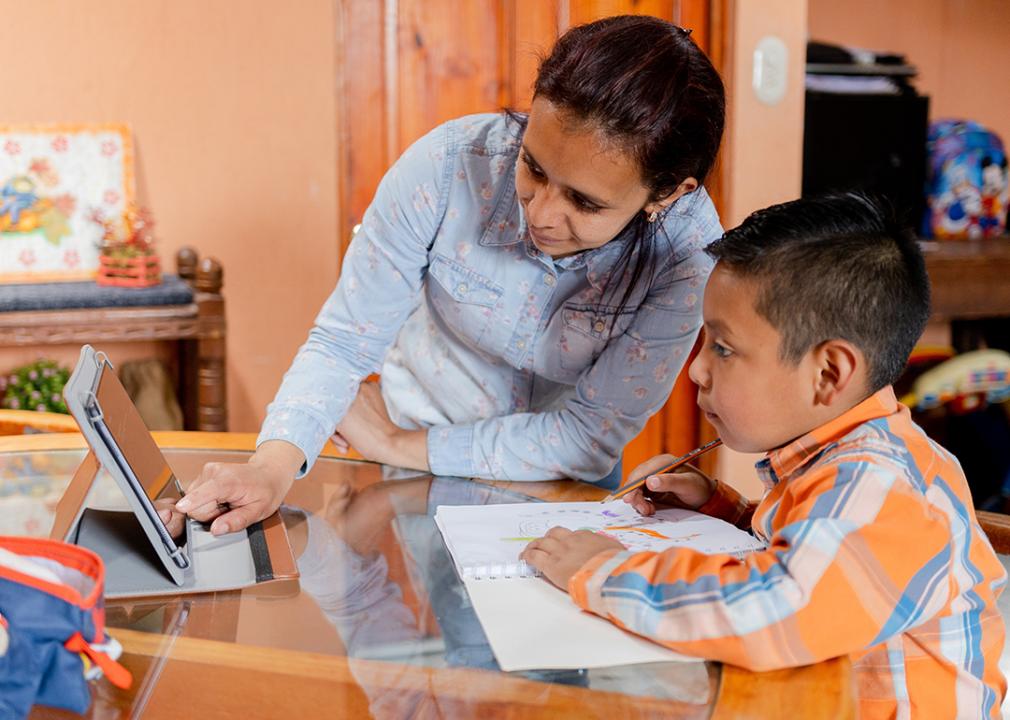Home-schooled kids face unique college challenges − here are 3 ways they can be overcome

Fernanda_Reyes // Shutterstock
Home-schooled kids face unique college challenges − here are 3 ways they can be overcome
Adult helping child navigate a tablet set up at a table doing schoolwork in room with orange walls.
Home-schooling is the fastest-growing education setting in the United States. More than 3 million students were educated at home in the 2021-22 school year, up from 2.5 million in the spring of 2019. Current estimates from the U.S. Census Bureau indicate that there are 3.62 million students home-schooled in the United States. That’s a meteoric increase from about 1 million in 1997.
Some experts, including Harvard law professor Elizabeth Bartholet, find the increase a cause to call for greater regulation. University of Washington education policy professor David Knight agrees, citing a lack of accountability and measures of student progress. Knight also worries about an absence of certain disciplines such as social studies that public schools are required to teach.
For those who have researched the home-school movement and studied its past, these are not new concerns. The Conversation asked two of those experts, Kenneth V. Anthony, associate professor of elementary education at Mississippi State University, and Mark E. Wildmon, assistant professor of school psychology at Mississippi State University, to explore what is known about home-schooling and readiness for college.
Data shows home-schooled students fare well
In 2020, Anthony and Wildmon reviewed the evidence about how well home-schooling prepares people for college, career and life and published what they learned in a book chapter titled: “Life after Homeschool.”
They found evidence that home-schooled students are just as prepared academically for higher education as traditionally schooled peers. In one study, researchers drew a sample of 825,672 students – including 732 students who had been home-schooled – and found the home-schooled group scored higher on several measures of college preparedness, including the SAT and first-year GPA in college.
Ave Maria University education professor Marc Snyder came to similar results in a 2013 study. Snyder compared home-schooled and traditional students at his Catholic university in Florida to find the average ACT scores for home-schooled students was 26. Public school students averaged 24.22, and students who attended Catholic schools averaged 24.53.
Snyder’s study reinforces data from the ACT itself. The testing outlet reported that from 2001-2019, the average ACT scores for home-schooled students trended up, while public school students’ scores declined slightly. In 2023, the national average on the ACT was 19.9; the average for home-schoolers was 22.8.
Areas of concern abound as home-school growth accelerates
Still, calls for regulation persist because of a host of challenges home-schooled students present. The Coalition for Responsible Home Education wants states to require minimal qualifications of a high school diploma or GED for the parent providing primary instruction, instruction for students in the same subjects as in public schools, and annual standardized assessments. In some states, they note, parents don’t even have to tell their local school district of their intent to home-school.
The pro-regulation side points to studies showing home-schooled students feel less prepared for college and are four times less likely to go to college after high school. Home-school students also take an average of one fewer math and science course than traditional peers.
Home-schooled students also often lack resources and guidance provided in traditional high schools for college prep. And social challenges abound when these students transition; a study of seven home-schooled graduates in Pennsylvania found students struggling to maintain their existing moral beliefs related to drinking, drug use and sexual norms, with the majority admitting they changed some beliefs and practices.
There’s also data that shows home-schooled students find the more structured academic environment on university campuses to be difficult to adjust to after a more lax experience learning at home.
Still, efforts to regulate home-schooling face opposition from parents as well as advocacy groups such as the Home School Legal Defense Association. In March 2024, for example, these forces defeated an attempt in New Hampshire to require home-school students to take a statewide exam.
3 ways to improve home-schooling
To help home-schooled students transition to college, parents can take three steps to better prepare their kids.
- Prioritize math and science to help address the math and science gap. Parents can use online courses offered through virtual high schools or employ tutors.
- Enroll in dual-credit or community college courses to provide a taste of the structure of college life and to interact with peers from diverse backgrounds.
- Talk to children about the diversity of perspectives they will encounter at college. This can help prepare them for how to negotiate and respect the opinions of others.
Home-schooled students can successfully transition to college and compete with their peers. The challenges they face are entirely foreseeable, which means they can be addressed easily.
![]()
This story was produced by The Conversation and reviewed and distributed by Stacker Media.